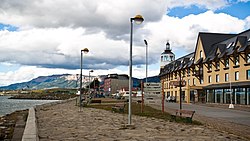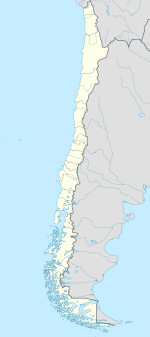Puerto Natales
Natales | |
|---|---|
 | |
| Nickname: Natales | |
| Coordinates (city): 51°44′S 72°31′W / 51.733°S 72.517°W | |
| Country | |
| Region | |
| Province | Última Esperanza |
| Commune | Natales |
| Founded | 1911 |
| Government | |
| • Type | Municipality |
| • Alcalde | Fernando Paredes Mansilla (UDI) |
| Area | |
• Total | 48,974.2 km2 (18,909.0 sq mi) |
| Elevation | 3 m (10 ft) |
| Population (2012 Census)[3] | |
• Total | 18,505 |
| • Density | 0.38/km2 (0.98/sq mi) |
| • Rural | 2,138 |
| Sex | |
| • Men | 10,068 |
| • Women | 9,048 |
| Time zone | UTC−3 (CLST) |
| Area code | 56 + 61 |
| Website | www.muninatales.cl |
Puerto Natales is a city in Chilean Patagonia. It is the capital of both the commune of Natales and the province of Última Esperanza, one of the four provinces that make up the Magallanes and Antartica Chilena Region in the southernmost part of Chile. Puerto Natales is the only city in the province.[4] It is located 247 km (153 mi) northwest of Punta Arenas. It is the final passenger port of call for the Navimag ferry sailing from Puerto Montt into the Señoret Channel as well as the primary transit point for travellers to Torres del Paine National Park, Chile.
It is located at the opening of Última Esperanza Sound and was originally inhabited by the Kawésqar or Alacaluf people and the Aoniken or Tehuelche people. The first Europeans to visit the area where the city is located were the expeditionaries led by Juan Ladrillero, a Spanish explorer who was looking for the Strait of Magellan's western passage in 1557.[5]
The city was settled in the late 19th century by European immigrants, primarily Germans, British, including English, Welsh and Scots, Croats, Greeks, Italians and Spaniards. It was then settled by Chilean people, with a substantial number coming from Chiloé Archipelago, all attracted by the sheep breeding industry.
The city was formally founded under the government of Ramón Barros Luco on May 31, 1911. Nowadays, one of its most important industries is tourism although the cattle and aquaculture industries are also significant. While winds, colds and thin soils limit horticulture in Puerto Natales there is still a small-scale local produce of zucchini, cherry tomatoes, strawberries, cucumbers and carrots.[6]
- ^ "Asociación Chilena de Municipalidades" (in Spanish). Archived from the original on 17 January 2021. Retrieved 27 January 2011.
- ^ "Municipality of Puerto Natales" (in Spanish). Archived from the original on 17 January 2021. Retrieved 27 January 2011.
- ^ a b c "National Statistics Institute" (in Spanish). Archived from the original on 6 January 2019. Retrieved 27 January 2010.
- ^ Mary Heebner, Patagonia, La Última Esperanza
- ^ Arriagada, Ramón (2004). Juan Ladrillero, el Navegante Olvidado (1st ed.). Puerto Natales: Editorial Fiordo Azul.
- ^ "Frente a la adversidad del clima: El desafío de cultivar hortalizas en la zona más austral del mundo". Cooperativas de Chile (in Spanish). 2019-08-05. Archived from the original on 2024-06-26. Retrieved 2023-01-06.


